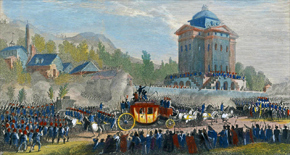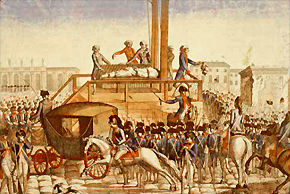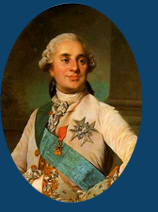
Louis-Augusta was born in Versailles on August 23, 1754, the third son of the Louis-Ferdinand, Dauphin of Viennois and Maria Josepha of Saxony and the grandson of the reigning King of France, Louis XV.
In his early years, he was not expected to inherit the throne. His oldest brother, Louis, duc de Bourgogne (September 13, 1751 - March 22, 1761), took precedence in the training, education, and preparation of being the heir apparent. The second oldest brother, Xavier de France (February 8, 1753 – February 22, 1754) died a year after birth. Only after the death of his own father (December 20, 1765) were there any considerations made in focusing on the needs of the next ruler of France, Louis-Auguste.
He was described as a shy and rather awkward young man. Louis was married in May of 1770 to the Archduchess Marie Antoinette, daughter of the Habsburg Empress Maria Theresa, to strengthen the Franco-Austrian alliance.
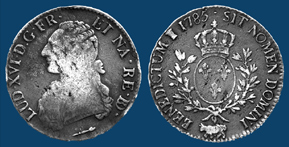
Upon meeting his new bride, Marie Antoinette became confused at his lack of interest in her. Unknown to the creators of the royal alliance, Louis was unable to or perhaps unwilling to consummate the royal marriage. It was thought that he suffered from a medical condition known as phymosis, which prevented him from fathering children. The public, knowing nothing of this, blamed Marie Antoinette for her failure to bear heirs to the throne. This fact alone brought a great amount of criticism and mockery down on the monarchy.
In April of 1777, Emperor Joseph came to call on his sister and brother-in-law, the subsequent six-week visit was to some extent ceremonial and to a certain extent an attempt to figure out why their marriage had not been consummated. After talking to the king himself, Joseph was convinced that the king had “satisfactory” erections but that, upon introducing his “member”, didn't stay inside long enough to ejaculate, having no clue as to what else he was supposed to do. It was due to Joseph's intervention that eight months later, in April, it was suspected that the queen was finally pregnant. The following year, Marie Therese Charlotte was born.
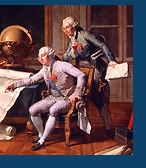 At the time of his accession to the throne, Louis was not only young, he was unprepared to govern; educational efforts had focused on his elder brother, who died prematurely. The new monarch's natural qualities: piety, loyalty, sense of duty, curiosity and interest in technology were not the ones required of a king. And his lack of personal presence was in sharp contrast to the majesty of his predecessors. His love for his people (who reciprocated it) could not compensate for his total lack of decisiveness, which proved fatal for the monarchy.
At the time of his accession to the throne, Louis was not only young, he was unprepared to govern; educational efforts had focused on his elder brother, who died prematurely. The new monarch's natural qualities: piety, loyalty, sense of duty, curiosity and interest in technology were not the ones required of a king. And his lack of personal presence was in sharp contrast to the majesty of his predecessors. His love for his people (who reciprocated it) could not compensate for his total lack of decisiveness, which proved fatal for the monarchy.
He neglected his royal duties in favor of hunting and working in his locksmith shop. He failed to give consistent support to ministers who tried to reform the outmoded financial and social structures of the country, such as Turgot and Necker. He allowed France to become involved in the War of American Independence, which exacerbated the national debt. Meanwhile, Marie Antoinette's propensity for frivolous conduct and scandal helped to discredit the monarchy.
Conditions in France had deteriorated badly, which made the government weak. The royal treasury was empty. By 1789, the state was bankrupt and Louis XVI had no choice but to summon a meeting of the Estates General. His sole reason for gathering the Estates General was simply to vote on taxes as required. However, the middle class organization had other ideas.
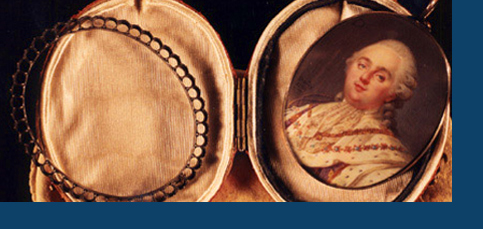
 Louis-Augusta was born in Versailles on August 23, 1754, the third son of the Louis-Ferdinand, Dauphin of Viennois and Maria Josepha of Saxony and the grandson of the reigning King of France, Louis XV.
Louis-Augusta was born in Versailles on August 23, 1754, the third son of the Louis-Ferdinand, Dauphin of Viennois and Maria Josepha of Saxony and the grandson of the reigning King of France, Louis XV.
 At the time of his accession to the throne, Louis was not only young, he was unprepared to govern; educational efforts had focused on his elder brother, who died prematurely. The new monarch's natural qualities: piety, loyalty, sense of duty, curiosity and interest in technology were not the ones required of a king. And his lack of personal presence was in sharp contrast to the majesty of his predecessors. His love for his people (who reciprocated it) could not compensate for his total lack of decisiveness, which proved fatal for the monarchy.
At the time of his accession to the throne, Louis was not only young, he was unprepared to govern; educational efforts had focused on his elder brother, who died prematurely. The new monarch's natural qualities: piety, loyalty, sense of duty, curiosity and interest in technology were not the ones required of a king. And his lack of personal presence was in sharp contrast to the majesty of his predecessors. His love for his people (who reciprocated it) could not compensate for his total lack of decisiveness, which proved fatal for the monarchy. 